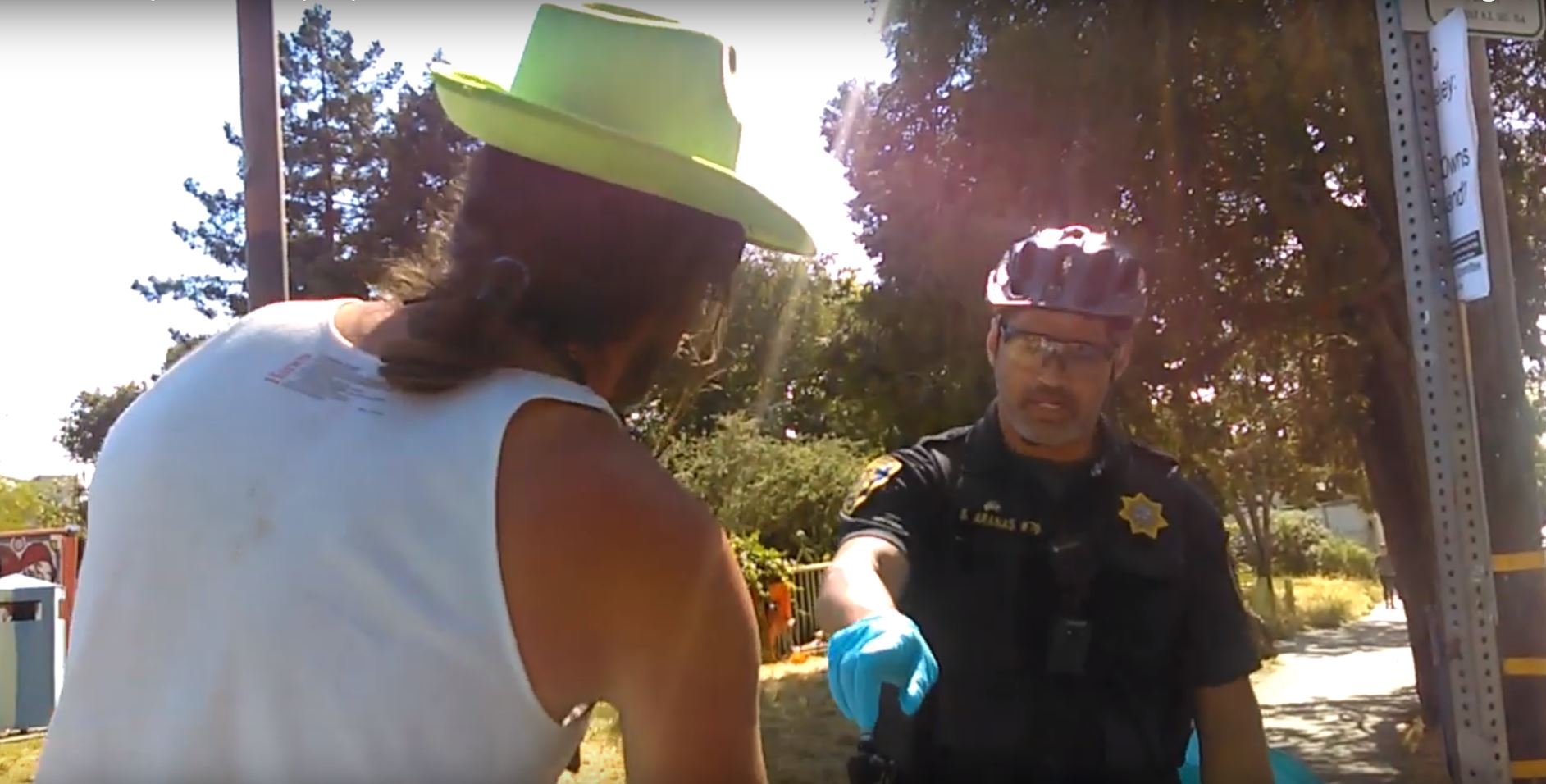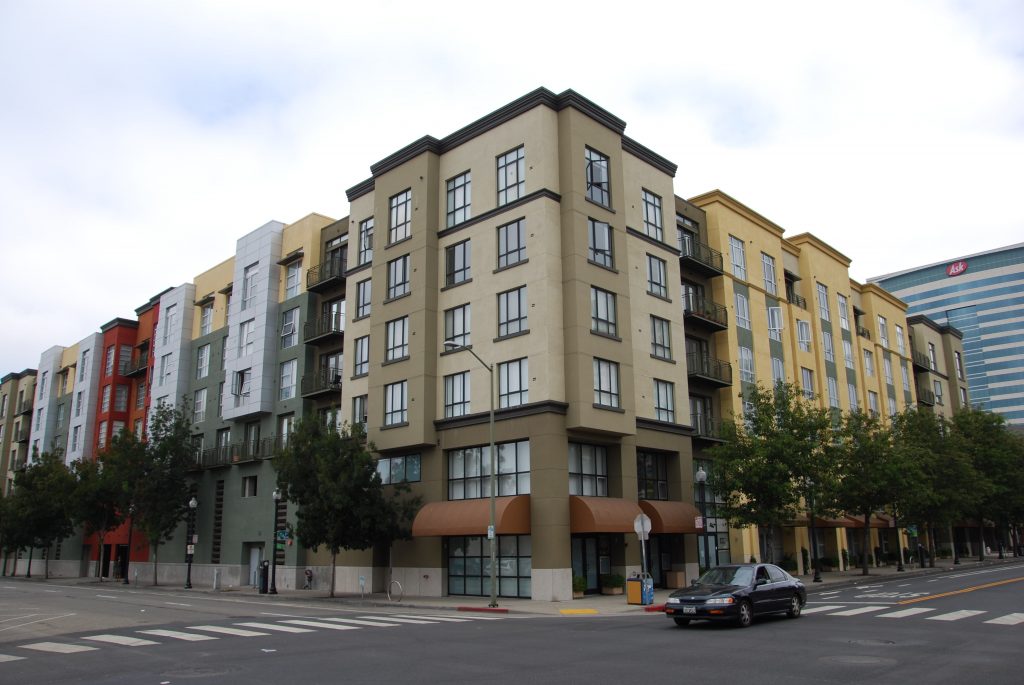David “Ninja Kitty” Teague was with friends outside the student union at the University of California Berkeley when, like many times before, Officer Sean Aranas of the UC police force approached on a bicycle. This time, he told them they couldn’t have their cellphones plugged into outdoor outlets. A conflict erupted, as members of the group called Aranas a “bully” and demanded to see his sergeant, according to a video Teague filmed of the encounter and posted on Facebook.
A sergeant then approached the group. “We’re getting complaints about the amount of trash here, the loitering here, the problems we’ve had here, including the theft of utilities,” he said. Aranas seemed to take something from one of their bicycles. Outraged, they accused him of theft, and a man with a prosthetic leg ended up in a struggle with the officers, losing his prosthetic as he was forced onto his stomach and handcuffed. The officers pulled him to his feet and made him hop on one foot across the plaza to a patrol car.
Teague, 27, has been homeless in Berkeley since he was 14 years old. He said that Aranas has been harassing him and other homeless people for a decade, taking their property and violently arresting them, often without charges. Teague’s Facebook page contains video after video of Aranas sitting on his bicycle staring at Teague and his friends and occasionally arresting them, often by force.
Teague was one of several people who provided videos of Aranas to Berkeley Copwatch, which started a flyering campaign in July to draw attention to the officer. A man who lives in People’s Park filed a complaint with the department’s internal affairs unit alleging that Aranas grabbed his testicles and threatened him during an arrest in January.
Aranas retired from the force on Aug. 30. The university police department did not respond to questions about Aranas. Janet Gilmore, the university’s senior director of strategic communications, confirmed that Aranas had retired after 21 years with the force but declined to answer questions about the timing or the allegations against him. “Police personnel matters are generally confidential,” she wrote in an email.
But many of Berkeley’s homeless residents and civil rights advocates still question why the university appeared to stand by Aranas for so long despite years of complaints against him. After a 2017 incident when he was recorded on video confiscating money from a hot dog vendor on campus went viral, the university police department conducted an 8-month internal investigation into the incident, but concluded that Aranas had acted within his authority. After the uproar over that incident, the East Bay Community Law Center called for the university to broaden its investigation of Aranas to include several allegations of excessive force. A 2017 petition calling for his removal from the force gathered 58,000 signatures.
“I’m very glad that the immediate danger that this officer posed to our community has been mitigated,” said Berkeley Copwatch co-founder Andrea Prichett. “But I’m also concerned that these abuses could go on for so long and be so glaringly obvious without some intervention by the UC administration.”
Before he retired, Aranas declined to be interviewed for this story, but said via email: “I don’t stand for ridiculous statements that anyone using a little bit of deduction could dispose of.”
With the prestigious university at its core, Berkeley is well known for its students’ push for free speech in the 1960s. But the city’s history of protest has also at times resulted in violence against protesters. On campus, part of that response came from the UC Berkeley police, a security patrol first established in 1915. Today the department employs 56 sworn police officers who carry guns to police the campus.Their jurisdiction extends to a mile beyond the campus boundaries.
Many of the officers leave the city’s homeless people alone, residents say, but others, including Aranas, make a point of hassling them. Restrictive city policies haven’t helped.
Last year, Berkeley enacted new restrictions on what can be stored in public places. In March, the Berkeley City Council voted to ban overnight RV parking without a permit. Advocates say policies like that do little to address the root causes of homelessness, and simply shuffle people to other cities and counties. According to the findings of the county’s 2019 Homeless Count and Survey released in July, countywide homelessness increased from 5,629 homeless residents in 2017 to 8,022, a 43 percent jump. Berkeley’s homeless population only rose from 972 to 1,108, a 13 percent increase, while neighboring Oakland’s homeless population rose 47 percent.
Jesse “Cactus” Timms said he has been arrested by Aranas three times this year. Originally from Southern California, Timms is a Navy veteran who now lives in People’s Park, a university-owned park built in the 1960s by community members on a plot of land that had been partially demolished by a university development project.
According to his lawyer, Oakland civil rights attorney EmilyRose Johns, Timms was arrested by Aranas for illegal lodging in January while protesting a renewed push to build housing on the park. He was never formally charged. Timms alleges that during the arrest, Aranas grabbed his testicles. While twisting his arm, Timms said Aranas told him he’d break it if he told anyone. Timms reported the incident to the university, which opened an internal affairs investigation.
Johns said they have not decided whether they will take further action against the university.
Timms was arrested on May 11 for gardening in the park and resisting arrest. And then he was arrested again two days later. During that arrest, which was captured on video, Timms confronted Aranas while he was taking down tents in People’s Park. When he said that one of the tents was his, Aranas said, “You’re detained right now. What do you need out?”
Timms reached for the tent and said, “I’m taking this down.” Aranas grabbed him by the neck and threw him to the ground.
Aranas used a similar tackling move, grabbing a person by the neck and slamming them to the ground, in another video taken by Teague a day prior and covered in Berkeley’s student newspaper. As in the incident with the disabled man, Teague’s group was outside the student union. After confronting a man with a prop sword, Aranas placed the man under arrest for refusing to identify himself. Without provocation, Aranas grabbed him by his neck and flipped him onto the plaza.
While Aranas was considered particularly problematic among many homeless people in Berkeley, advocates see his actions as part of a broader pattern of hostility toward homeless people by city and university police, one driven in part by local business owners. When asked for an interview, Aranas suggested contacting Stuart Baker, executive director of the of the Telegraph Business Improvement District. Baker spoke highly of Aranas’s “high presence” and accessibility in the BID. Baker suggested that people who take issue with Aranas’s actions just have a problem with police in general.
“I haven’t ever seen him be disrespectful to anyone,” Baker said. “I’ve only seen him be respectful and professional in how he directs his comments and interactions with the public in general.”
Osha Neumann, the supervising attorney of the East Bay Community Law Center, said that he thinks Aranas was just doing what the university and business community wanted. “They want to make it so miserable that all those pesky homeless street people will disappear,” he said.
Teague said that his possessions have repeatedly been thrown away by both city and university police even when he only leaves them for a few minutes, such as to go to the restroom. After he enrolled in Berkeley City College, his textbooks were thrown out, Teague said, complicating his efforts to get an education and get off the streets. “Nobody out here steals from me,” Teague said. “Only the police.”
Johns said that it continues to be difficult for homeless people to get their possessions returned after they’re confiscated by university police, even when she’s advocating on their behalf. In January, she complained to the university about the drawn out process in retrieving some homeless people’s property a week after they were arrested in People’s Park, including wallets and medication.
Timms’ girlfriend and fellow activist, Diana Soline, says the pattern of harassment inflicted by Aranas and others makes survival even harder for homeless people struggling to get by.
“They’re the most vulnerable people in the society. They are disabled and they’re homeless and who’s going to stand up for this kind of stuff?” she said. “Emotionally, it’s very, very difficult to fight something like this when you live on the streets.”

